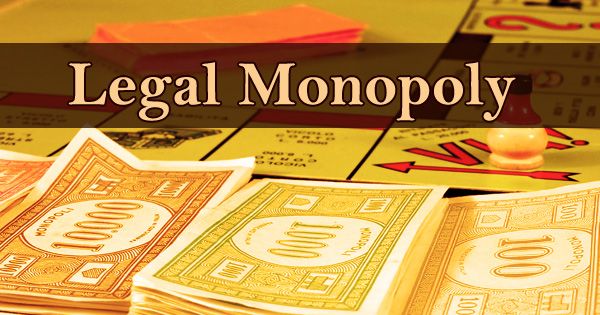A legal monopoly, also known as a statutory monopoly, or de jure monopoly refers to a corporation that, under a government order, acts as a monopoly. A monopoly is a business that sells a product or service that has no immediate alternative. It exists when there is only one supplier and there is a barrier preventing entry into the business of new companies and the provision of competition. At the end of the day, legitimate syndication is a firm that gets an administration order to work as an imposing business model. This kind of restraining infrastructure generally diverges from a true imposing business model which is a general classification for syndications that are not made by the government.
Legal monopolies can be established through:
- A public franchise
- A government license
- A patent or copyright
At a regulated price, a legal monopoly sells a single product or service. It is a situation in which, in return for the right to be tracked and controlled, the government grants a company to be the sole supplier of a good and/or service. Initially, a legal monopoly is ordered because it is regarded as the best option for a government as well as its citizens.

(Example of Legal Monopoly)
Some of the disadvantages of a monopoly:
- Higher prices and lower output
- Consumer exploitation and bullying
- Poor quality and service
- A potential limitation of innovation
A legal monopoly, however, is established by the government, either nationally or in a particular region, with subsidies and privileges. The prevailing theory behind the establishment of legal monopolies is that if too many rivals invest in their own distribution infrastructure, in a given market, costs across the board will rise to unreasonably high levels. In return for the help and rights by the legislature, the administration at that point has the option to screen and manage any exercises, rates, and arrangements. While this thought has merit, it doesn’t continue itself inconclusively, in light of the fact that much of the time, free enterprise, in the long run, prevails upon legal monopolies.
The government is capable of controlling prices in a legal monopoly and supplying the populace with freely available services/goods, supervising firm operations, and preferably changing the monopoly to function in the best interest of customers. A monopoly broadcasting agency was founded in several countries in the middle of the twentieth century, such as the BBC, Radiodiffusion-Télévision Française, or RAI. At the end of the century, most big countries relaxed their rules or privatized their public broadcasters. Legal monopolies infrastructures on liquor remain genuinely normal, both as a wellspring of public income and as a method for control.
As there are no competitions on the market, monopolies do not need to innovate in their products/services or provide excellent customer service. Bus services have a legal monopoly in many cities, but some city councils have legalized bus competition because of pressure from customers who want cheaper fares and entrepreneurs who want to offer them. Then, imposing business models on opium and cocaine once significant income sources were changed over or re-founded during the 20th century, to check the maltreatment of controlled substances.
The lack of competition, which also leads to a lack of incentives to develop the product or service offered, is a major drawback to any monopoly. In an English revolution, the Law of Monopolies of 1623 was an early step in transforming letters patent from a method of rewarding royal favorites at a non-royal cost to a method of promoting inventors. The guideline of betting in numerous spots incorporates a legitimate restraining infrastructure, concerning public or state lotteries. Where private activities are permitted with organizations like pony hustling tracks, of course, wagering scenes, and club, the specialists may permit just a single administrator.
Information Sources:
















